 Petzlover
Petzlover Cardigan Welsh Corgi is originated from United Kingdom but Havanese is originated from Cuba. Cardigan Welsh Corgi may grow 6 cm / 3 inches higher than Havanese. Cardigan Welsh Corgi may weigh 8 kg / 18 pounds more than Havanese. Both Cardigan Welsh Corgi and Havanese has almost same life span. Cardigan Welsh Corgi may have less litter size than Havanese. Cardigan Welsh Corgi requires Low Maintenance. But Havanese requires High Maintenance
Cardigan Welsh Corgi is originated from United Kingdom but Havanese is originated from Cuba. Cardigan Welsh Corgi may grow 6 cm / 3 inches higher than Havanese. Cardigan Welsh Corgi may weigh 8 kg / 18 pounds more than Havanese. Both Cardigan Welsh Corgi and Havanese has almost same life span. Cardigan Welsh Corgi may have less litter size than Havanese. Cardigan Welsh Corgi requires Low Maintenance. But Havanese requires High Maintenance
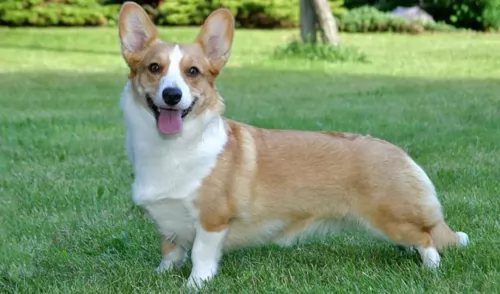 The Cardigan Welsh Corgi, named after Cardiganshire, Wales, is an ancient breed, brought to Wales by the Celts about 3,000 years ago.
The Cardigan Welsh Corgi, named after Cardiganshire, Wales, is an ancient breed, brought to Wales by the Celts about 3,000 years ago.
Small but tough, the Cardigan used to take part in cattle drives and his duties extended to protecting them at night.
The first pair of breeding Cardigans arrived in the United States in June 1931. The AKC granted full recognition to the breed four years later.The Cardi, as the breed is commonly called, was developed as an all-around farm dog in Wales. It is believed to be a descendant of the Pomeranian, Schipperkes, Keeshond and Swedish Valhund.
The Cardigan and the Pembroke Welsh corgis were separated officially into different breeds in the early 1930s. AKC recognition came in 1935.
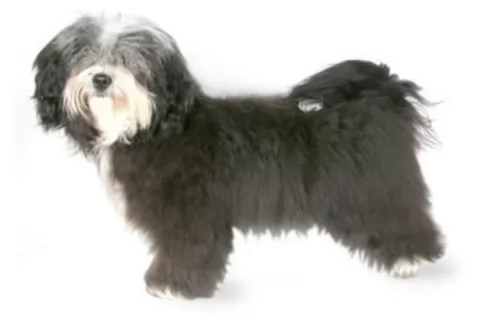 The only breed of dog that is native to Cuba is the Havanese. These little dogs are great companion animals. Sociable and happy, they are very popular in the United States with urbanites. These happy little pups are a Bichon type of dog which was developed from the “Little White Dog of Havana” or the Blanquito de la Habana which is now extinct.
The only breed of dog that is native to Cuba is the Havanese. These little dogs are great companion animals. Sociable and happy, they are very popular in the United States with urbanites. These happy little pups are a Bichon type of dog which was developed from the “Little White Dog of Havana” or the Blanquito de la Habana which is now extinct.
The Blanquito de la Habana was itself developed from another extinct breed the Bichon Tenerife. Then the Blanquito was bred with the other Bichons and poodles in developing the Havanese. It is believed that some of the first people to settle in Cuba were from Tenerife, an island close to Cuba. In the early part of the sixteenth century, little white dogs were brought to Cuba with these settlers. This dog of Tenerife is believed to be the ancestor of all Bichon breeds.
At that time trade with Cuba was highly restricted by the Spanish and so these dogs developed without any crossing from other breeds from outside the country. They grew to be able to stand hot temperatures and they grew a very unique coat – almost like silk. Their coat is soft and light, while insulating them from the tropical environment.
At this time Cuba was the place to be for Europeans aristocrats on vacation. Unlike the British colonies, Cuba had theatres, operas and palacious. When going back to Europe, many took this little white dog with them to France, Spain and England. The Dog of Havannah was a favorite on European soil as well. Many of these dogs taken to Europe were fawn or parti instead of white. Meanwhile back in Cuba, the bourgeoisie were replacing the aristocracy who themselves would soon be replaced by the Revolution.
During the days of the bourgeoisie, the Havanese became very popular household pets. The breed has been a family pet for the last 150 years. At the same time the breed was very trendy in Europe with Charles Dickens and Queen Victoria owning several. They were by now familiar participants in Europe’s dog shows. Finally, with the Revolution, the bourgeoisie left the country in droves with their little white dogs. A genetic pool was then formed in the US. Gene pool from 11 dogs. All the Havanese in the world are descended from those 11 dogs with the exception of the dogs isolated in Cuba and the US. Today the Havanese is one of the most popular and fastest growing breeds in the world.
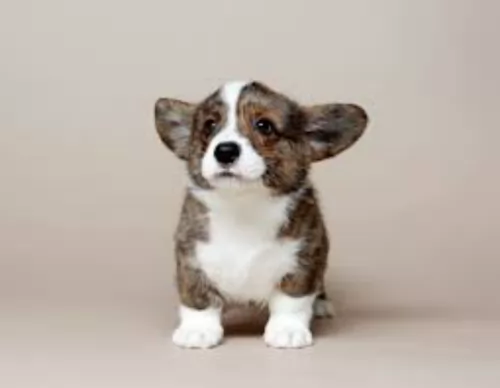 The long-shaped Cardiganshire Welsh Corgi is also nicknamed the ‘yard-long dog’ in Wales. Don’t be fooled by this low-to-the-ground dog, because when you look at him he isn’t a small dog at all, looking almost like a German shepherd with short legs, upright ears and a long, bushy tail.This is unlike the Pembroke Welsh Corgi whose tail is traditionally docked.
The long-shaped Cardiganshire Welsh Corgi is also nicknamed the ‘yard-long dog’ in Wales. Don’t be fooled by this low-to-the-ground dog, because when you look at him he isn’t a small dog at all, looking almost like a German shepherd with short legs, upright ears and a long, bushy tail.This is unlike the Pembroke Welsh Corgi whose tail is traditionally docked.
The Cardi stands around 270 to 330mm tall at the withers and weighs between 11 to 17kg. With those short legs he can gather up quite a speed as well. The dog has a double coat in fawn, red, black and with the outer coat being of medium length and quite harsh to the touch. You can also find some white on the neck, chest as well as on the legs.
The Cardigan Welsh Corgi is full of spirit and makes a fantastic companion for someone looking for a fun-loving, devoted friend. He is an easy going dog, making a wonderful pet, while being reserved with strangers. He isn’t a tall dog but he will guard the family too. He is good with children in the family and even with other pets, provided he is trained and socialized.
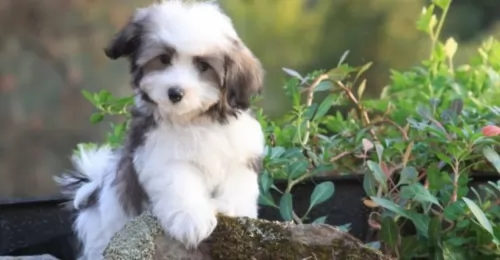 The Havanese is a sturdy little dog, a member of the toy group. They weigh no more than 16 pounds (7.3kg) and his body is longer than it is tall. The breed has a unique topline that is not level, but it is straight. His front legs are longer than his hind legs producing the lively gait everyone is used to seeing with a Havanese. With a full muzzle that tapers to the nose, the Havanese does not seem to be short. The skull’s length is the same as the muzzle’s. The head of the Havanese is round in the back and flat in the front.
The Havanese is a sturdy little dog, a member of the toy group. They weigh no more than 16 pounds (7.3kg) and his body is longer than it is tall. The breed has a unique topline that is not level, but it is straight. His front legs are longer than his hind legs producing the lively gait everyone is used to seeing with a Havanese. With a full muzzle that tapers to the nose, the Havanese does not seem to be short. The skull’s length is the same as the muzzle’s. The head of the Havanese is round in the back and flat in the front.
They have a deep chest, almond shaped eyes that are dark brown and their ears are about halfway down the nose. The long ears hang down the side od the face. They have a long plumed tail that is held high and upward. The standard for the breed and now the laws of the United Kingdom state that there can be no docking of the tail.
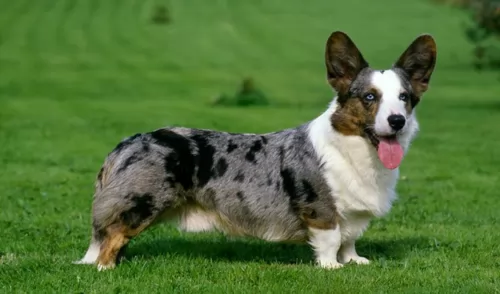 The Cardigan Welsh Corgi is full of surprises and he has been a strong working job, being quick and agile around cattle. He is good at everything and with training and socialization he is going to make an excellent pet.
The Cardigan Welsh Corgi is full of surprises and he has been a strong working job, being quick and agile around cattle. He is good at everything and with training and socialization he is going to make an excellent pet.
They are good with children and other pets and he makes an excellent guard dog as well. He is strong willed and feisty but he wants to please his owner. With a dog like this in your life, you’re going to have a faithful and loving friend who knows how to entertain you as well with his antics.
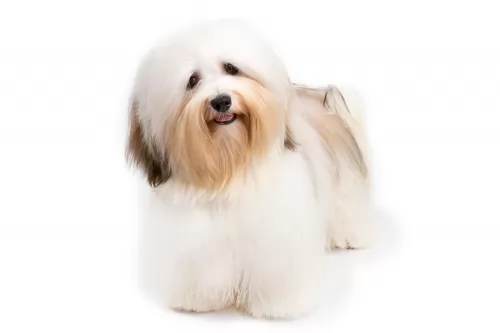 Havanese are highly intelligent and eager to please, and they are easily trained so long as you use only positive methods. This can be a sensitive breed, so care must be taken to not scold them harshly. Socialization from an early age is very important. Expose them calmly to a wide variety of new places and new people, always ensuring that the experiences are positive and not intimidating. Gentle, patient training will result in a wonderful companion dog. They are affectionate with people and get along with other nonaggressive pets.
Havanese are highly intelligent and eager to please, and they are easily trained so long as you use only positive methods. This can be a sensitive breed, so care must be taken to not scold them harshly. Socialization from an early age is very important. Expose them calmly to a wide variety of new places and new people, always ensuring that the experiences are positive and not intimidating. Gentle, patient training will result in a wonderful companion dog. They are affectionate with people and get along with other nonaggressive pets.
The Havanese is the consummate lap dog. Over time they have become the lovable family companion.
The breed is pretty adaptable being able to live as a companion animal in almost any setting. Just don’t expect your Havanese to go hiking or romp with you on 40 acres in the country.
They are intelligent, love to learn but can be a little stubborn. Train them early as they like their habits and its much harder to train an older Havanese.
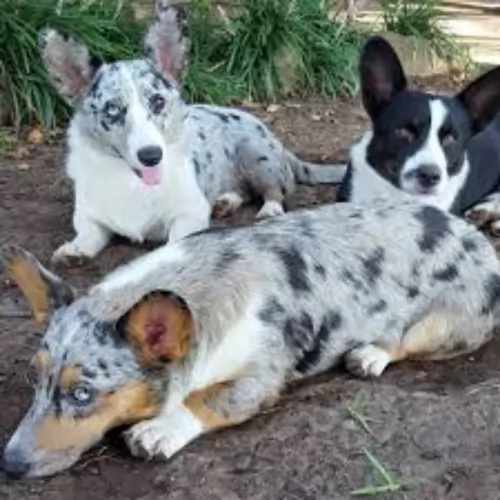 The Cardigan Welsh Corgi is a generally healthy breed with an average lifespan of 12-15 years. Like all dogs, they will have some health concerns, and recognizing the symptoms of some common dog illnesses can spare your pet.
The Cardigan Welsh Corgi is a generally healthy breed with an average lifespan of 12-15 years. Like all dogs, they will have some health concerns, and recognizing the symptoms of some common dog illnesses can spare your pet.
This is a debilitating genetic joint condition that can affects any dog really. It occurs when the hind leg joint isn’t held properly by the hip socket. Bone is worn away and your dog can experience severe pain.
Unfortunately this is a common skeletal disorder and your pet will be reluctant to jump or play. Untreated, it can lead to arthritis and chronic pain, making him immobile. There are several types of treatments and you want to get your pet to the vet to relieve him of pain and discomfort.
This is a terrible disease for your pet because the rear legs can actually become paralyzed and your pet won’t be able to control their bowels. It is an inflammatory autoimmune disease where the dog’s immune system cells attack the spinal cord sheath. If your vet suspects Degenerative Myelopathy, a blood sample will be required. Sometimes the dog has to be mercifully euthanized. Sometimes people even turn to holistic treatments to avoid this and help their pet.
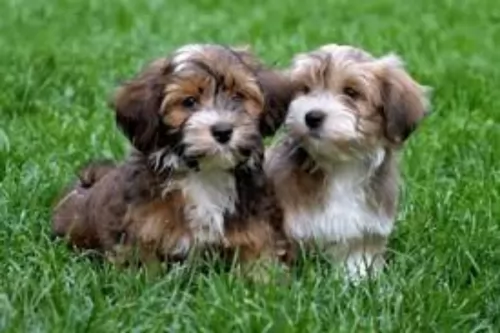 A very healthy breed, the Havanese doesn’t have a lot of health issues, but they are not immune to the problems of small breed dogs. The issues they do have are:
A very healthy breed, the Havanese doesn’t have a lot of health issues, but they are not immune to the problems of small breed dogs. The issues they do have are:
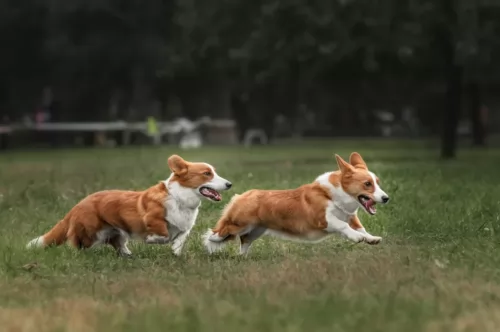 Cardigan Welsh corgis are active dogs and he is going to need daily exercise. He’ll love a walk with you and will show you how agile he is when you throw a ball for him
Cardigan Welsh corgis are active dogs and he is going to need daily exercise. He’ll love a walk with you and will show you how agile he is when you throw a ball for him
The Cardigan is a low maintenance dog. His thick double coat does shed quite a bit but nonetheless it is easy to maintain. Simply give it a good brush to remove loose hairs and to get rid of dirt. This brushing distributes the dogs natural oils and helps to keep the coat shiny and healthy.
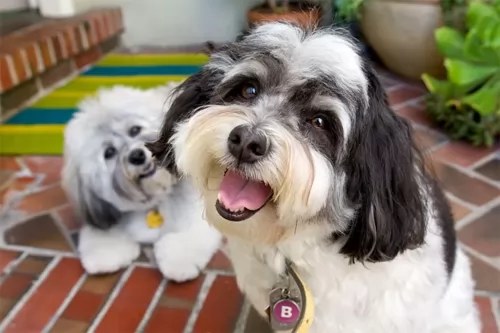 Feed 3 to 4 times per day a high quality dry puppy food for toy or small dogs. Feed ¼ to ½ cup each time.
Feed 3 to 4 times per day a high quality dry puppy food for toy or small dogs. Feed ¼ to ½ cup each time.
Remember these are small dogs and don’t overfeed. Feed a high quality dry food for small or toy dogs. Feed twice a day at about ½ cup each time.
The breed is generally very healthy.
This breed is not an overly active dog, but he does need some exercise. A nice walk once a day or a backyard to play in. They play inside as well as out. Don’t over exercise the Havanese. They do well in obedience and confirmation more so than agility or fly ball